Here’s another in my Finance Friday series. To read the whole series, follow this category tag and enjoy!

This week, we’re talking about retirement – of the equine variety.
Guiding Questions
I’ve been thinking a lot about equine retirement lately. Tristan is 23, and while I fervently hope that he has many happy years left, it’s also likely that someday he will need to step down from his level of work. I’m the kind of person who likes to be as prepared as possible for things, and I also want Tristan’s retirement to be a stepping stone to my continuing involvement with horses – not the end.
Horses are expensive, and just because you’re not riding them doesn’t mean they get less expensive. August was arguably my most expensive month of the entire year, and I didn’t sit in the saddle once. Continuing to ride actively with a retired horse means more money – enough for a second horse, or a lease, or frequent lessons.
I want to stress throughout this post that no matter what, Tristan and his needs come first. I will not add on stress to my finances unless I am absolutely certain at the core that he can get whatever he needs, without question. If that means I have a retired horse and catch ride at best, so be it. But I’d like to have another riding horse. That means that as a person with a nonprofit salary and a mortgage, I need to plan this carefully.
To help me think this through financially (emotionally is going to require, like, another two years of therapy at least), I brainstormed all the questions I had, sorted through them, and created a survey to try to see how other people had answered them. Thank you to everyone who took the survey – reading through the responses was a huge help to my thinking process!
So in this post, I’d like to share the results of the survey. This is not meant to be a final “retirement costs X and here’s how you can make it all work!” kind of post. Everyone’s situation is going to be different. What I want to do here is look at the big picture, and think about all the options available.
Survey
I had precisely 100 respondents to the survey, which I conducted through Google Forms. I advertised it here, on my Facebook page, and on the Chronicle of the Horse forums. A lot of you shared it as well, and thank you for that! And now, results.
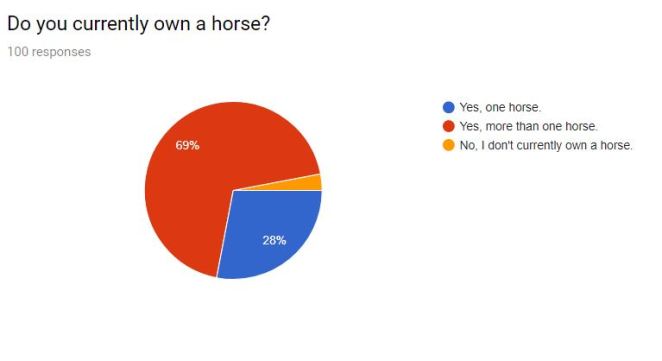
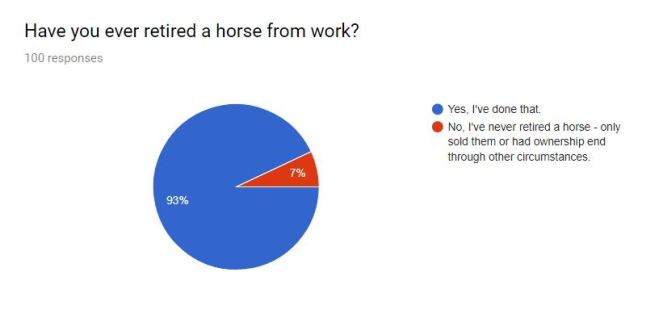
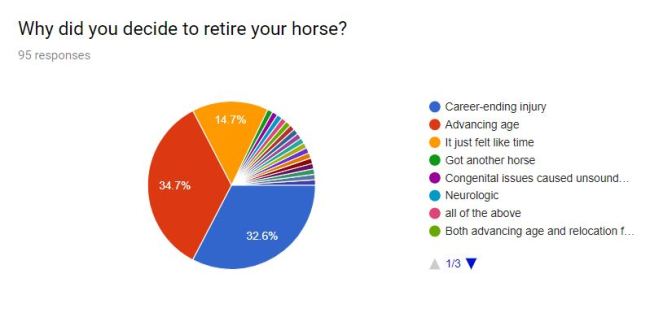
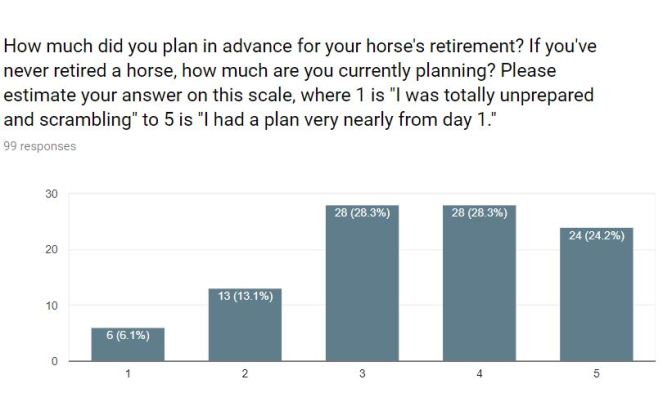
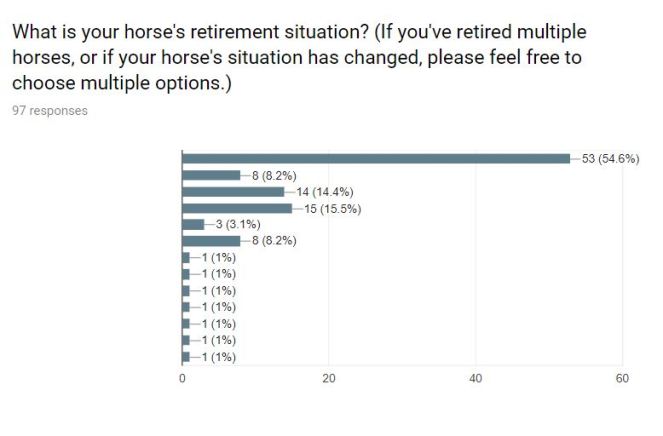
Those answers are, in order:
Retired at my own farm
Retired at a nearby farm belonging to friend or family
Retired in place at the same boarding barn
Retired at nearby farm where I pay board
Retired at further away farm belonging to friend or family
Retired at further away farm where I pay board
The miscellaneous answers include retirement as a companion horse, part-lease to a light work home, and future plans to purchase a farm.
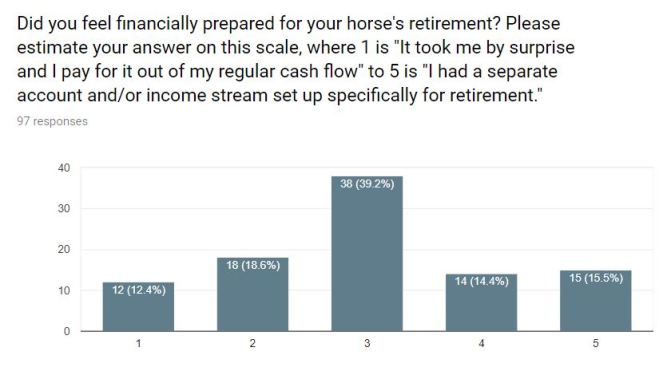



Not a surprise exactly, but 85.3% report that overall costs have stayed stable or gone up, and 85.4% reported that vet bills have remained the same or gone up.
And what about those costs? The graph won’t copy over easily, but here’s the breakdown. Keep in mind, these are averages only:
Retired at my own farm – $101 – $250 per month
Retired at a nearby farm belonging to friend or family – $251 – $500 per month
Retired in place at the same boarding barn – $251 – $500 per month (but a strong second for $500 – $750)
Retired at nearby farm where I pay board – $501 – $750 per month
Retired at further away farm belonging to friend or family – across the board, no clear average in this category! Probably $500 is a good middle number.
Retired at further away farm where I pay board – Two clear categories here: $250 – $500, and $1,000+!
Selected Comments
Is there anything you wish you’d known, financially, about retiring your horse?
Not really; just that emotionally it is hard to accept, some days.
Once you retire them, they seem to live forever!
That his once a year mother of all vet bills would be continuing. It seems to just be who he is.
It wasn’t much cheaper to keep a nonworking; horse still needed about the same amount of grain, though remained on usual supplements/meds and barefoot. Moving horses home made keeping my retiree much more reasonable; otherwise her costs were the same/more than my riding horse as she needed meds and extra feed.
I wish I could have anticipated the lack of ability to travel/move to better areas for work. Due to arthritis issues, it is no longer fair to move the horse around if I want to get a working student position/internship.
Leasing out is not for me. Thought I would get a part leaser but given location there isn’t many people who are looking to just flat around in the area. Had hoped could reduce costs by having a lease or part lease.
Retirement facilities are not always the best or cheapest options.
Is there anything else you think it’s important to now or to take into account from a financial perspective when retiring your horse?
Have some hard and fast rules for under what circumstances horse would be put down.
Retired horses still need shots, dental care, hay and may not always be able to be barefoot. While keeping my horses at home makes it easier to keep the retired guy, the only aspect of his care that is “cheaper” lies in the fact that I’m not paying to compete him and so far, he hasn’t needed his hock injections since he’s not working.Does a more expensive retirement farm = a more reputable, “safe” place for the horse?All my horses have “trust funds” set up in my will. When I am not around to take care of them, I want to know that they will always be taken care of the same way as I currently do.You also have to set aside money for end of life arrangements, that can be $1k or more.A horse coming out of work entirely from an otherwise active career will struggle physically and mentally. You will need to support him with time and money.if you have time to show/compete your horse, you have money to give them a good retired life. they deserve a good life for all they have done for us.care costs can be dependent on the barn owner’s philosophy – ie, I boarded at a small, basically retirement facility with exceptional care (as it suited the young, not-healthy horse well) and felt the need to do vet care above and beyond my own comfort level to maintain at the owner’s comfort levelYou just need to be prepared for the aggregate cost. My horse has been retired for about 11 years (he’s now 29) and I have spent over $50,000 on him as a retired pasture pony. Scary, but what are you going to do? There are no retirement options close to where I live, so I see him maybe once a month. There’s no way we have the same relationship, but his needs are greater than mine and he’s in a fabulous retirement situation.

I was late to the survey so you had already posted results, I had originally planned on retiring Carlos – the original plan was my mom was going to get property and I was going to retire him out there, that obviously didn’t happen and also my mom ended up not buying property. Ramone I sold before he even reached his peak, and Dante the plan currently is if anything bad happens to him and he needs retirement I’ll send him to his breeders.
LikeLike
I participated in it and I found it interesting. It made me stop and think about things and I realized that I have no regrets. I love that I can keep irish and see him everyday. He owes me nothing (although he could stop pooping in his water bucket).
LikeLike
People can get so prickly sometimes. Leaving not nice comments on a survey does what exactly? I did respond to the survey and have 2 retired horses. We boarded the one for several years before moving home and his costs were identical to my active mare at the time minus costs for endurance rides, traveling and tack purchases. Basic care was the same though.
LikeLike
Thanks for sharing
LikeLike
Thank you. I like your post
LikeLike
The very idea of “retirement” is up in the air since many folks in their mid-60s cannot afford to quit work and might never do so.
LikeLike
This technique of creating a mental image of the desired outcome is used by many of the most successful professional athletes and business entrepreneurs.
LikeLike
The emphasis one puts on retirement planning changes throughout different life stages. Early in a person’s working life, retirement planning is about setting aside enough money for retirement.
LikeLike
The retirement planning is a long time process, where nothing happens suddenly. One have to start early enough and to follow the plan several ears. The yearly steps are small but they will bring the results.
LikeLike